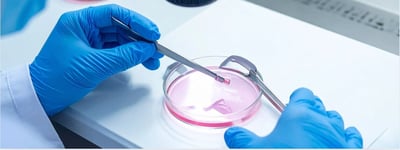.jpg)
October 19, 2022
Implications of Donor (Gamete) Conception – part 1
We continue our series of blogs written by our counsellor Mollie Graneek, our wonderful counsellor who loves helping people in their fertility journey. In the first part, Mollie talked about the psychological impact of infertility.
Implications of Donor (Gamete) Conception
A gamete (Ancient Greek - gamete from gamein "to marry”) is a cell that fuses with another cell during fertilization (conception) in organisms that reproduce sexually. In species that produce two morphologically (morph means ‘form’ and ‘ology’ means the study of - how things are put together) distinct types of gametes, and in which each individual produces only one type, a female is any individual that produces the larger type of gamete—called an ovum (or egg)—and a male produces the smaller tadpole-like type—called a sperm.
Sperm Donation
Sperm donation in a medical setting first took place at the Jefferson Medical College in Philadelphia, USA in 1884. It has been widely used over the last 50 years but with little documented evidence until 1991 when, the Human Fertility and Embryology Authority started to keep records of all births as a result of assisted reproduction from licensed fertility clinics. In 1945 Dr Mary Barton published the first modern account of donor insemination in the British Medical Journal. The response to her paper was almost universally condemned.
Around the world politicians and church leaders called for donor insemination (sperm) to be made illegal. It was considered a sin by the Catholic Church and in the UK the Archbishop of Canterbury set up an enquiry calling for Parliament to make it illegal. Although there were heated debates, this did not happen. What happened was that donor conception was conducted in secret and became something which was not outwardly spoken about. That continued for many years but in the 1970s views of donation began to change and in the USA laws were passed which made donor insemination legal but in the UK this did not happen until 1990 when, the Human Fertilisation and Embryology Act was passed.
Egg Donation
Egg donation raised similar ethical, moral and of course, religious issues. It began in the 1980s and the first pregnancy resulting from this technique was reported in Australia in 1983. When egg donation was first introduced, the eggs came from either close friends or family or, they came from women who were undergoing IVF themselves. This practice continued to expand and now in the 21st century, we find ourselves swamped with the need for donated eggs in order to cope with the demand. As a result, egg donation has taken on corporate and commercial heights.
Concerns about the potential exploitation of egg or sperm donation is something fertility clinics address on a daily basis. Questions of morality, legality and clinical concerns remain debatable and, in some instances unanswerable. As a specialist fertility counsellor, I am often asked to comment on people’s decision to achieve pregnancy through egg or sperm donation and on whether I approve.
Brought up in a deprived area of Glasgow which, was heavily influenced by the Roman Catholic Church, I often reflected on the moral and ethical issues around controversial medical treatment. When the Abortion Act was passed in 1967 I was 12 and, reflecting my parents’ views, was appalled that there could be such indiscriminate loss of ‘life’.
However, in spite of society’s apprehension around new medical techniques, they continued to improve and in 1978 the first test-tube baby was born. The birth of Louise Brown was deemed a miracle and this medical break-through became a symbol of hope to women who were unable to conceive naturally. But again, the ethical and moral issues of test-tube conception were challenged.
Things to Consider
Donor conceived children now have the right to identify their genetic donor when they reach the age of 18 or, should they plan to marry, 16. It is important therefore that donors or recipients of egg or sperm are made fully aware of the ramifications of their request for treatment.
Since the laws changed in 2005, licensed clinics are expected to encourage donors or, people hoping to achieve pregnancy through donation, to promote an openness and honesty with regard to the origins of conception, with any child that results from treatment. Although the laws support this, there is, of course, no law that can force a parent to tell a child anything other than what they want to tell them. Indeed there are many parents who will not tell their child and suggest that culturally it is not acceptable. Counselling at an early stage of treatment will help donors and recipients digest the importance of why these laws were passed and the potential implications of creating their family through donation.
In the next few parts, Mollie will talk about:
– How to decide if donor route is right for you;
– Is counseling ‘mandatory’ before donor conception?
– Diversity of Fertility Treatment;
– Fertility Counselling in Self-Sex Relationships.
To find out more about Mollie, please visit this blog.
.jpg?upsize=true&upscale=true&width=400&height=200&name=Untitled%20design%20(1).jpg)

